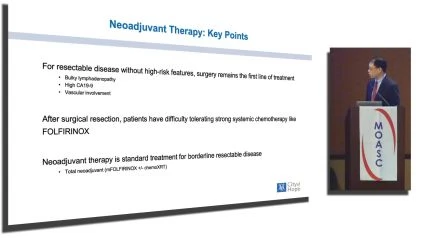Pancreatic Cancer Updates – Insights from Vincent Chung, MD
Discover the latest advancements in the field of pancreatic cancer through an enlightening presentation by Dr. Vincent Chung, a distinguished figure in oncology and a consultant for Perthera. Delve into the comprehensive exploration of Pancreatic Cancer, its challenges, and the transformative approaches to treatment. This event, held on August 12, 2023, at the MOASC / UCI Spotlight on Oncology, presents crucial updates that could revolutionize the landscape of pancreatic cancer care.
Understanding the Scope of the Problem
With the unfortunate distinction of having the worst survival rates among solid tumors, pancreatic cancer poses a substantial challenge. The estimated projections for 2023 underscore the severity of the issue, with over 64,000 new cases expected and approximately 50,550 unfortunate deaths. Despite these dire statistics, a glimmer of hope shines as five-year survival rates have doubled over the last decade.
Rationale for Neoadjuvant Treatment
Unpacking the aggressive nature of pancreatic cancer, Dr. Chung emphasizes the recurrent nature of the disease and the struggles patients face in tolerating chemotherapy post-surgery. Neoadjuvant treatment, which administers early intervention for micrometastatic disease and avoids surgery in rapidly progressing cases, emerges as a promising strategy. Supported by a retrospective review of 541 patients from 2009-2019, the advantages of Total Neoadjuvant Therapy (TNT) and Short Neoadjuvant Therapy (SNT) are unveiled, shedding light on enhanced chemotherapy completion rates and heightened complete response rates.
Adjuvant Therapy for Pancreatic Cancer
Exploring different approaches to adjuvant therapy, the CONKO-01, ESPAC4, and PRODIGE 24 trials provide valuable insights. These trials evaluate the effectiveness of Gemcitabine, Gemcitabine combined with Capecitabine, and the potent FOLFIRINOX regimen, respectively. Notable differences in median overall survival among these trials open avenues for further discussions and considerations in treatment strategies.
Neoadjuvant Therapy: Transformative Insights
For resectable cases without high-risk features, surgery remains the primary treatment. However, the role of neoadjuvant therapy becomes paramount in borderline resectable disease. Factors such as bulky lymphadenopathy, high CA19-9 levels, and vascular involvement shape the decision-making process. Neoadjuvant therapy, especially the mFOLFIRINOX regimen with or without chemoradiation, establishes itself as the standard of care in these cases.
Advancements in Advanced Pancreatic Cancer Treatment
MPACT and PRODIGE 4 / ACCORD 11 trials showcase significant improvements in advanced pancreatic cancer treatment. The benefits of these treatments are evident in the enhanced overall survival and progression-free survival rates. A newer four-drug regimen, NALIRIFOX, offers promising results in treatment-naïve patients with metastatic PDAC, paving the way for new avenues of exploration.
Unveiling Early-Onset Pancreas Cancer
Early-onset pancreatic cancer takes center stage, with genetic insights revealing the prevalence of pathogenic variants in genes like BRCA1, BRCA2, and PALB2. The identification of RAS wild-type tumors and specific fusion variants among these patients highlights the complexity of early-onset cases.
Emergence of Personalized Treatments
The landscape shifts towards personalized treatment approaches, as a substantial percentage of pancreatic cancer patients harbor actionable molecular alterations. Integrating germline and somatic mutation testing becomes pivotal, offering patients matched therapies and significantly extending median overall survival.
Strategic Conclusions
The journey through Pancreatic Cancer Updates, guided by Dr. Vincent Chung, unveils a trajectory towards more effective treatments. As the years progress, innovations like NALIRIFOX, targeted therapies, and the significance of germline testing are reshaping the future of pancreatic cancer care. This comprehensive update promises to revolutionize clinical strategies and elevate the prospects of patients battling this formidable disease.
NAPOLI-3 Trial NALIRIFOX [2023] Slides – Chung, MD – MOASC

